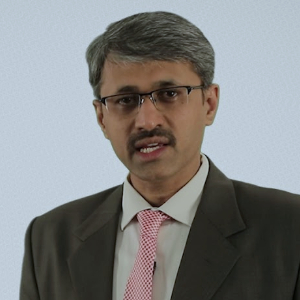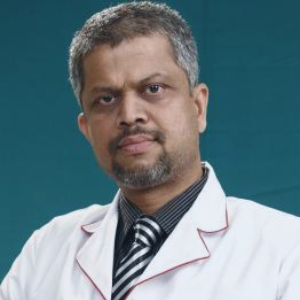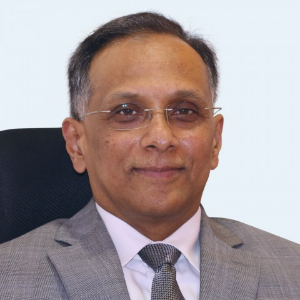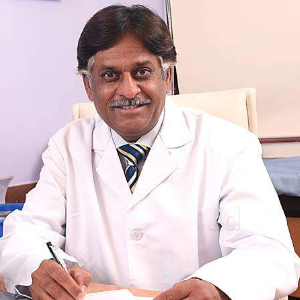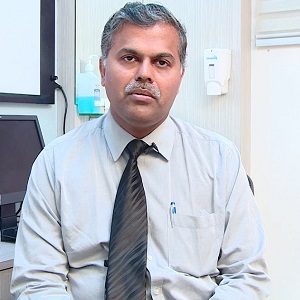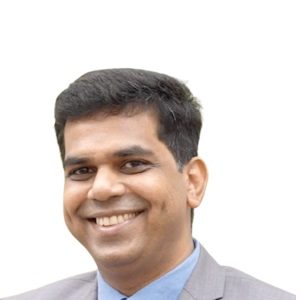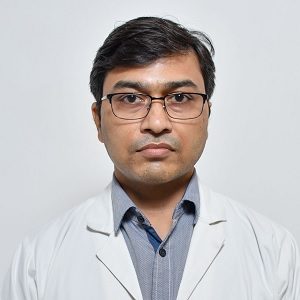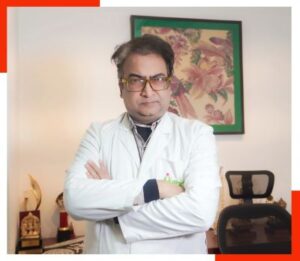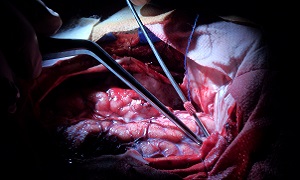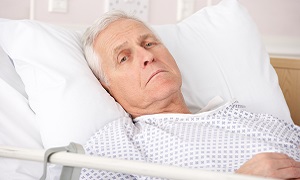Best Doctors in India for Deep Brain Stimulation
Here are the most reputed neurosurgeons in India expertised in Deep Brain Stimulation (DBS) procedure for the treatment of movement disorders like Parkinson’s disease (PD), essential tremor, dystonia, and other neurological conditions.
- Neurosurgeon & Spine Surgeon, Bengaluru, India
- Over 15 years’ experience
Profile Highlights:
- Dr. Praveen K S is a highly qualified neurosurgeon with over a decade of experience in handling all kinds of neurological diseases and disorders.
- He specializes in Pediatric Neurosurgery, Neuro-Oncology, Endoscopic neurosurgery, Aneurysms, and Neuro- Trauma and has performed over 4000 neurosurgeries in his career.
- Neurosurgeon & Spine Surgeon, Mumbai, India
- Over 20 years’ experience
Profile Highlights:
- Dr. Rahul Modgi is a highly established neuro and spine surgeon in Mumbai specializing in all types of brain and spine surgeries.
- Dr. Rahul Modgi’s name has been recorded in the Limca Book of Records in 2014 when he removed the heaviest iron rod from the brain of a 17-year-old patient. He has also performed various other risky surgeries for which he has greatly appreciated.
- Neurosurgeon, Bengaluru, India
- Over 30 years’ experience
Profile Highlights:
- Dr. Rajakumar V Deshpande is a renowned Neurosurgeon in Bengaluru. He performed the first pedicle screw fixation surgery for a spine injury in Bangalore.
- Dr. D V Rajakumar specializes in endoscopic neurosurgeries and has performed some of the most complex brain and spine surgeries through the endoscopic approach. His other areas of interest include minimally invasive neuro surgeries, management of cerebrovascular diseases, and brain tumor surgeries.
- Neurosurgeon, Mumbai, India
- Over 20 years’ experience
Profile Highlights:
- Dr. Suresh Sankhla is an accomplished Neurosurgeon in Mumbai specializing in endoscopic neurosurgery and onco-neurosurgery.
- Dr. Sankhla acquired his training in neurosurgery under the guidance of the best trainers from well-known medical institutes and hospitals in Ireland, UK, USA as well as India.
- He has an equal interest in research and has published more than 100 articles, papers, and abstracts in renowned national and international peer-reviewed journals.
- Neurosurgeon, Chennai, India
- Over 25 years’ experience
Profile Highlights:
- Dr. M. Balamurugan is a well-known neurosurgeon in India with 25 years of experience.
- Dr. Balamurugan assists in managing Carotid Body Tumor Embolization, Brain Arteriovenous Fistula Embolization, Nerve and Muscle Disorders, Spinal and Cerebral Tumor Embolization, etc.
- Dr. Balamurugan is a life member of various prestigious associations and institutions.
- He also authored research studies or papers and articles for several publications.
- Neurosurgeon, Chennai, India
- Over 22 years’ experience
Profile Highlights:
- Dr. Srinivasan Paramasivam is a well-known Neurosurgeon in India having an overall experience of 22 years.
- He is associated with Apollo Hospital, Chennai as a senior consultant – neurosurgeon following his assignments abroad.
- Dr. Paramasivam earned a fellowship in Endovascular Neurosurgery from New York. He has 17 years of specialized experience in Neuro Interventional Surgery, Cerebral Angioplasty, Brain Tumor Surgery, Surgical Clipping, etc.
- Neurosurgeon, Gurugram, India
- Over 25 years’ experience
Profile Highlights:
- Dr. Pawan Goyal is a renowned neurosurgeon in Gurugram with 25 years of experience.
- He gained expertise in endoscopic neurosurgery, minimally invasive spine and neurosurgery, all brain and spine tumors, head and spine injuries.
- Neurologist
- Over 20 years' of experience
Profile Highlights:
- Dr. Praveen Gupta is one of India’s top Neurologists, who is currently serving as the Principal Director & Unit Head of Neurology at Fortis Memorial Research Institute, Gurugram.
- Over the course of his 23-years career, Dr. Gupta has made a lasting impact on the field of neurological treatment.
- Among his many firsts, Dr. Gupta founded the first-ever stroke centre in Gurugram and pioneered the use of single-arm mechanical thrombolysis, which completely changed the way strokes are treated in the area.
- He also pioneered Deep Brain Stimulation (DBS) treatments for Epilepsy and Parkinson’s disease, raising the bar for neurological care.
- Gupta has been the founder of two prestigious neurology departments at prestigious corporate hospitals, Artemis and Paras. He has consistently managed the highest possible number of both inpatient and outpatient cases, with an exceptional daily volume of 50 and 100 patients respectively.
- As a highly sought-after speaker, Dr. Gupta often contributes to the progress of neurological treatments and services by sharing his knowledge at national and international conferences.
Best Hospitals in India for Deep Brain Stimulation
Paras Hospital, Gurugram
- City: Gurugram, India
Hospital Highlights:
- Paras hospital was established in 2006 and is the 250 bedded flagship hospital of Paras Healthcare.
- The is supported by a team of doctors of international and national repute.
- The hospital is NABH accredited and also the first hospital in the region to have a NABL accredited laboratory.
- The hospital provides specialty medical services in around 55 departments including Neurosciences, Joint Replacement, Mother & Child Care, Minimal Invasive Surgery, Gynecology and Obstetrics, Ophthalmology, Dermatology, Endocrinology, Rheumatology, Cosmetic and Plastic surgery.
- The hospital is equipped with state-of-the-art technologies.
S L Raheja Hospital, Mahim, Mumbai
- City: Mumbai, India
Hospital Highlights:
- SL Raheja hospital is a 140-bed multi-specialty tertiary care hospital that is being managed by Fortis Healthcare Ltd.
- The hospital is a benchmark in healthcare and medical facilities in the neighborhood of Mahim & the western suburbs.
- L.Raheja Hospital, Mahim has one of the most effective ICU and Casualty care services.
- The hospital provides specialty medical services in Cardiology, Oncology, Neurology, Orthopedics, Mother & Child Care, and in Diabetes.
Wockhardt Hospitals, Mumbai
- City: Mumbai, India
Hospital Highlights:
- Wockhardt Hospitals were established in the year 1973, originally called First Hospitals and Heart Institute.
- Wockhardt Hospitals are super specialty health care networks in India, nurtured by Wockhardt Ltd, India’s 5th largest Pharmaceutical and Healthcare company.
- Wockhardt Hospitals is associated with Partners Harvard Medical International, an international arm of Harvard Medical School, USA.
- Wockhardt Heart Hospital performed India’s first endoscopic heart surgery.
- The hospital has a state-of-the-art infrastructure equipped with the latest technologies and modern equipment.
- It has special Centers of Excellence dedicated to the major specialties to provide hassle-free and high-quality clinical care.
Pushpawati Singhania Hospital & Research Institute, New Delhi
- City: New Delhi, India
Hospital Highlights:
- Established in 1996, Pushpawati Singhania Research Institute is one of the top hospitals in the NCR region, as well as one of the top facilities in India for gastroenterology. The hospital is one of South Asia’s first institutes in medical and surgical treatment for diseases related to digestion.
- The hospital is equipped with state-of-the art facilities coupled with the latest equipment as well as renowned consultants from various parts of India as well as other parts of the world.
Indian Spinal Injuries Center, New Delhi, India
- City: New Delhi, India
Hospital Highlights:
- The Indian Spinal Injuries Center (ISIC), provides state-of-the-art facilities for the management of all types of spinal ailments.
- Staffed with internationally trained, acclaimed, and dedicated spine surgeons, the hospital provides cutting-edge medical & surgical technology. The hospital provides comprehensive management of spinal injury, back pain, spinal deformities, tumors, osteoporosis, etc.
- The hospital performs motion-preserving spine surgeries including disc replacement and dynamic fixation, and minimally invasive spine surgeries such as endoscopic disc excision.
- The orthopedic service of the hospital covers all orthopedic ailments including trauma, joint diseases & replacements, oncology, pediatric orthopedics & upper limb ailment.
W Pratiksha Hospital, Gurgaon
- City: Gurugram, India
Hospital Highlights:
- W Pratiksha Hospital, Gurugram, is one of the best hospitals in the NCR region. It is also a top hospital in India for IVF. Since its inception, the hospital has performed over 5500 successful IVFs. The hospital also specializes in gynecology.
- With over 20 years of experience in providing quality healthcare, the hospital is known as one of the most trusted and valued health providers in India.
- Equipped with world-class medical facilities and advanced technology, the hospital’s doctors and clinicians also have a track record of delivering excellent results. The hospital is also known for focusing on preventive well-being as much as on curative treatment.
- The hospital has earned the trust of its patients, by providing the best available treatments at affordable costs.
Narayana Superspeciality Hospital, Gurugram
- City: Gurugram, India
Hospital Highlights:
- Situated near DLF Cyber City, Gurugram, Narayana Superspecialty Hospital is one of the top medical facilities in the Delhi NCR region, catering to the needs of the people. Known for its commitment to quality medical care and patient service, the hospital is a state-of-the-art facility with planned and well-equipped sections, which includes a spacious OPD area as well as comfortable patient rooms.
- It is the closest super-specialty hospital from Indira Gandhi International Airport towards Gurugram, and also the nearest super specialty hospital from DLF Cyber City. It is also close to major residential areas in Gurugram.
- It is part of the renowned Narayana Health Group. Established in 2000, by Dr. Devi Shetty, a renowned cardiac surgeon, it has grown to be one fo India’s leading healthcare groups.
Sir Ganga Ram Hospital, New Delhi
- City: New Delhi, India
Hospital Highlights:
- Sir Ganga Ram Hospital, New Delhi is known to provide the latest medical procedures with the latest technology in all of its units.
- The hospital has a team of reputed doctors, nurses, and healthcare professionals that ensure that patients receive quality care at affordable costs.
- Staffed with a team of highly qualified doctors, dedicated nurses, and paramedical and non-medical staff, the hospital aims to lead in healthcare delivery, medical education, training, and research.
- As per the vision of the founder, the hospital also provides free treatment to the economically weaker sections of society.
- Sir Ganga Ram Hospital also provides training to young doctors under the Diplomate in National Board(DNB) program. The DNB program at the hospital was started in 1984 and it is known for currently running the maximum number of DNB specialties in the country. It also has the distinction of having the first bone bank in India.
KIMS Hospital, Hyderabad
- City: Hyderabad, India
Hospital Highlights:
- KIMS Hospital (a brand name of Krishna Institute of Medical Sciences) is one of the largest and best multi-speciality hospitals in Hyderabad. The hospital provides various treatments to an enormous number of patients.
- The hospital has a capacity of more than 3000 beds. KIMS Hospitals offers different healthcare services in more than 25 specialities and super specialities.
- The hospital is equipped with modern medical equipment and technology. It has robotic equipment to provide minimal invasive techniques for patients.
- The hospital is aimed at providing world-class healthcare facilities and services at an affordable cost for patients.
- The various specialities and departments of the hospital include neurosciences, gastroenterology & hepatology, robotic science, reproductive sciences, dental science, oncological sciences, organ transplantation, heart and lung transplantation and mother and child care.
Fortis Hospital, Shalimar Bagh
- City: New Delhi, India
Hospital Highlights:
- Fortis Hospital in Shalimar Bagh is a multi-super specialty hospital that strives to provide world-class patient care by leaving no stone unturned.
- Fortis, Shalimar Bagh, with 262 beds and a 7.34-acre footprint, provides the best level of medical care through its team of doctors, nurses, technicians, and management professionals.
Deep Brain Stimulation
Deep brain stimulation is an elective surgical procedure, which involves implanting electrodes in certain areas of the brain. These electrodes or leads help in generating electrical impulses for controlling any abnormal activity in the brain. The electrical impulses can also adjust for any chemical imbalance within the brain which can lead to various conditions. A programmable generator resembling a pacemaker placed under the skin in the upper chest controls the stimulation of brain areas.
Deep brain stimulation has been approved for treating several conditions which include dystonia, epilepsy, essential tremor, Parkinson’s disease, and obsessive-compulsive disorder. Currently, it is also being studied as a potential treatment for addiction, chronic pain, cluster headache, dementia, depression, stroke recovery, multiple sclerosis, Huntington’s disease, Tourette syndrome as well as traumatic brain injury.
Purpose
Deep brain stimulation is an established treatment for people who are suffering from movement disorders, which can include essential tremor. Parkinson’s disease and dystonia, and psychiatric conditions such as OCD are few other ailments which can be treated by this procedure.
This treatment is reserved for the people who are unable to control their symptoms with the use of medications.
Preparation
Since deep brain stimulation is a serious as well as a risky procedure you need to weigh the pros and cons carefully, along with your doctor, even if you are considered eligible for the procedure.
Before the surgery, you will require a few medical tests for making sure that deep brain stimulation is safe and appropriate for you. You will also require brain-imaging studies such as an MRI, before your surgery to map the areas of your brain to implant the electrodes.
Procedure
The surgery for deep brain stimulation has two portions.
Brain surgery
For the brain surgery portion, the surgery team will fit you with a special head frame so that your head is still during the procedure. Then, team members will use magnetic resonance imaging (MRI) in order to map your brain. This will allow them to identify the areas in your brain where they will need to place the electrodes.
The surgery can be performed under general anesthesia or local anesthesia. If local anesthesia is used, it will numb your scalp before the procedure. However, you will not need an anesthetic inside your brain as it has no pain receptors.
Your surgeon will be implanting a thin wire lead with a number of contacts or electrodes at the tips into a specific area in your brain. He/she might also implant one lead into each side of your brain. Then a wire will run under your skin to a pulse generator which will be implanted near your collarbone.
During the surgery, your brain will need to be closely monitored by the surgeon and the neurologist, to help ensure correct electrode placement.
Chest wall surgery
During the second portion of your surgery, the surgeon will implant the part of the device containing the batteries under your chest’s skin, near the collarbone. During this procedure, general anesthesia will be used. Wires from your brain electrodes will be placed under your skin. They will then be guided down to the battery-operated pulse generator. This generator will be programmed to send continuous electrical pulses to the brain. You will be controlling the generator and you are also able to turn it off using a remote control.
After the procedure
The pulse generator in your chest will be activated in your doctor’s office a few weeks after your surgery takes place. Using a special remote control, the doctor will easily be able to program your pulse generator from outside your body. The amount of stimulation will then be customized to match your condition. Finding the optimal setting can take a few hours.
Depending on your condition, your doctor will advise you whether you need stimulation constantly running 24 hours a day, or you need to turn off the pulse generator at night before sleeping. The special remote control which you will receive from your doctor can help you turn the stimulation on and off. Your doctor may also program the pulse generator to let you make any minor adjustments at home.
Your generator’s battery life can vary with usage and settings. When your battery needs replacement, your surgeon will replace the generator during an outpatient procedure.
It is important to note that this procedure will not be curing your disease, but it can provide help in lessening your symptoms to a great extent. If this procedure works, your symptoms will be improving significantly. However they don’t go away completely and in some cases, you might still need medications for certain conditions. It is also noteworthy that this procedure isn’t successful for anyone. Before your surgery, it is important to talk with your doctor regarding the benefits, risks, and expectations.
Advantages
This procedure can be performed on either side of your brain, depending on your symptoms. For each patient’s clinical status, the effects can be customized individually for each patient’s clinical status.
The device can help to provide continuous symptom control 24 hours a day. If one sees side effects, stimulation settings can be modified to diminish them.
Risks
Deep brain stimulation is a minimally invasive surgery and is generally considered safe. However, like any other surgery, it has a risk of a few complications.
The first surgery involves creating small holes in the skull for implanting the electrodes, and the second surgery involves implanting the device with batteries under the skin in the chest.
Complications of surgery might include:
- Misplacement of lead
- Stroke
- Infection
- Bleeding in the brain
- Breathing problems
- Heart problems
- Seizure
- Nausea
Side effects that are associated with deep brain stimulation include seizure, infection, headache, difficulty in concentration, temporary pain and swelling at the implantation site, etc.
The device will be turned on a few weeks after your surgery, and the process of finding the best settings will begin. Though some of the settings can cause side effects, most of them can improve with further adjustment of the device.

